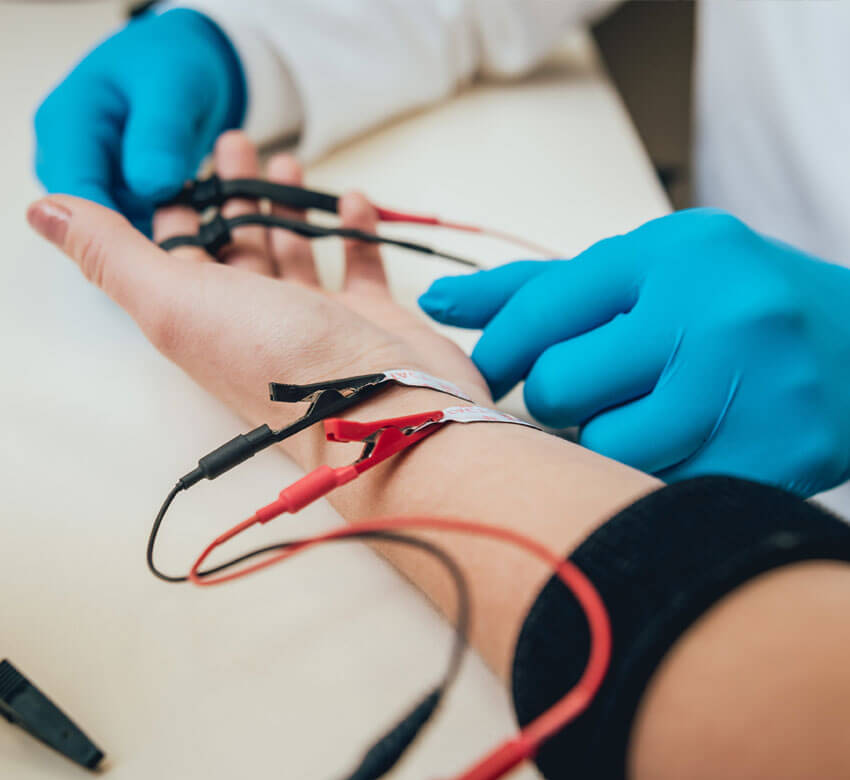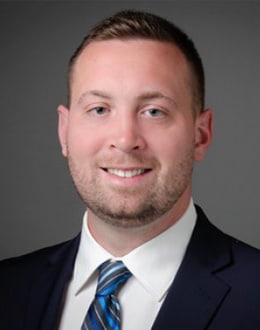Electromyography & Nerve Conduction Studies
If you’re dealing with numbness, burning, tingling, or weakness and can’t figure out why, your doctor might recommend electromyography (EMG) and nerve conduction studies (NCS) to identify the cause of your discomfort.
These diagnostic procedures aren’t just about finding problems in your upper or lower extremities. They can also rule out what’s not causing your symptoms—giving you and your specialist a clearer picture of what’s going on and making it easier to figure out the best way to help you feel better.

Conditions Diagnosed With EMG & NCS Testing
Find the Source of Your Muscle or Nerve Pain.
At Indiana Hand to Shoulder Center, we use electromyography (EMG) and nerve conduction studies (NCS) to accurately diagnose a variety of conditions. These advanced tests can help identify issues such as:
- Amyotrophic Lateral Sclerosis (ALS)
- Bell’s Palsy
- Brachial Plexus Injuries
- Carpal Tunnel Syndrome
- Charcot-Marie-Tooth Disease
- Chronic Muscle Weakness
- Complex Regional Pain Syndrome
- Cubital Tunnel Syndrome
- Dermatomyositis
- Fibromyalgia
- Guillain-Barré Syndrome
- Herniated Discs
- Motor Neuron Diseases
- Multiple Sclerosis
- Muscular Dystrophy
- Myasthenia Gravis
- Myopathies
- Nerve Injuries in Arms & Legs
- Neuropathies, Such as Diabetic Neuropathy
- Occupational Injuries
- Peripheral Artery Disease
- Peripheral Nerve Disorders
- Pinched Nerves
- Polymyositis
- Post-polio Syndrome
- Radial Tunnel Syndrome
- Radiculopathy
- Repetitive Motion Injuries
- Supinator Syndrome
- Tarsal Tunnel Syndrome
- Thoracic Outlet Syndrome
- Ulnar Neuropathy
“Dylan M. Abshire, DPT, ECS, is very kind and professional. I had a great experience. He is clearly very knowledgeable.”—EMG Patient
Meet Our Provider

Dylan M. Abshire, DPT, ECS is a board-certified electrophysiology specialist who performed a two-year residency training for EMG/NCS testing in Houston, TX. He is a committee officer for the national electrodiagnostic special interest group and an item writer for the electrodiagnostic board examinations. Dr. Abshire is integral to the team at the Indiana Hand to Shoulder Center, where he uses electromyography and nerve conduction studies to assist in the diagnostic process by focusing on detailed and precise assessment of nerve and muscle function. He plays a key role in gathering essential data that our specialists use to identify various neuromuscular conditions, ensuring every patient gets the best possible treatment plan.
For Fun
- Hometown: Bel Air, Maryland
- Hobbies: Surfing and Paddle Boarding
- What are you currently watching on Netflix? Lincoln Lawyer
- Favorite place in the world: Bethany Beach, DE
- Biggest pet peeve: When people don’t return their shopping cart and leave it in the middle of a parking space
Locations
FAQs About EMG & NCS Testing
How Do You Know If You Need EMG & NCS Testing?
Your healthcare provider will typically order an EMG/NCS study if you have symptoms like numbness, tingling, burning, weakness, or pain.
Are There Any Risks or Side Effects?
You may feel some discomfort and/or bruising. There’s a minimal risk of infection.
How Should You Prepare for Testing?
For your test, you should wear loose-fitting clothing. For neck and arm tests, wear a short-sleeved shirt or tank top and loose shorts for back and leg tests. Don’t apply lotions, oils, or creams to your skin on the day of your test, as these products may interfere with the examination. Generally, most medications won’t affect testing. Please speak with your specialist if you have any concerns.
What Should You Expect During Your Appointment?
Nerve studies include both NCS and EMG testing. The NCS portion is usually performed first, with a mild electrical stimulus applied to the skin to read your nerve health. An EMG test involves inserting a fine needle into your muscle to detect electrical activity in your muscles. In most cases, full testing is tolerated with little discomfort.
How Long Will the Testing Take?
Testing usually takes 20 to 40 minutes. After the testing, you can resume your normal activities.
Who Performs the Tests? Do They Have Special Qualifications and Training?
Testing is done by a doctor of physical therapy (DPT) with a board-certification in clinical electrophysiology. Their training includes over 2,000 hours of direct EMG testing, more than 500 individual EMG studies, and a specialty board exam.
Figure Out What’s Causing Your Pain
At Indiana Hand to Shoulder Center, we understand the challenges of living with unexplained nerve or muscle discomfort. With EMG and NCS testing, we can uncover the root cause of your muscle pain or weakness. Make an appointment today to get the answers you need to start treatment and begin feeling better.
Call us directly at (317) 875-9105 or (800) 888-HAND.
